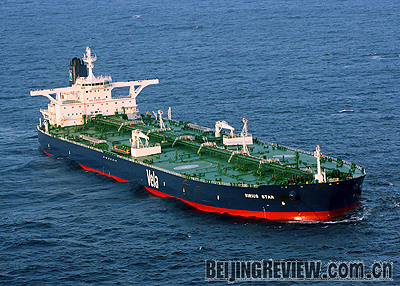|
|

VICTIM OF PIRACY: The hijacked supertanker Sirius Star sits at anchor off Somalia’s northeastern coast on November 19, 2008 (XINHUA/AFP) |
Piracy has recently become a top concern internationally as pirates seize luxury yachts and oil tankers alike off the Somali coast. On November 15, 2008, they hijacked the Saudi-owned supertanker Sirius Star and its $100 million cargo. The seizure of the ship, which some called the greatest pirate feat in history, not only made headlines in leading media outlets worldwide but also led to intensified anti-piracy efforts by many countries.
Statistics show that Somali pirates have seized 95 ships since the beginning of 2008. Today, they still hold 16 ships and 300 crewmembers. They hijacked five ships in just 10 days from November 7 to 16 last year. On November 18, they captured as many as three ships. As piracy grows increasingly rampant off Somalia's coast, the international community has vowed to enhance cooperation to combat the pirates there.
A variety of causes
There are deep-seated political, economic, social and moral reasons for the escalating piracy. Somalia has been embroiled in armed conflicts between feuding warlords since 1991. It does not have a central government that can put the country under effective control. Due to the political turmoil, the Somalis live miserable lives. Their average life expectancy is only 46 years. A quarter of Somali children die before the age of five. Chronic war, drought, hunger, tribal conflicts and soaring food prices have displaced millions of Somalis. Some 3.2 million people in the crisis-ridden country require humanitarian assistance.
|

GLOBAL CONCERN: A Somali representative attends the UN Security Council meeting on piracy off Somalia’s coast on December 2, 2008 (HOU JUN) | Since the Somali Government is unable to control its territorial sea, profit-driven foreign fishermen have come to catch fish off the Somali coast with sophisticated equipment. As a result, fish stocks have dramatically declined. Deprived of their only means of living, some local fishermen are forced to become pirates.
The Somali Government's tacit support has also fueled piracy, according to British media reports. The International Marine Organization says most of the pirates come from the semiautonomous region of Puntland in northeastern Somalia and are 20 to 35 years old. The prospect of becoming a millionaire overnight is highly attractive to young people. Somali pirates reaped a staggering $300 million in ransom in 2008, much more than Puntland's tax revenue and budget. Pirates spend a lot of money on consumption such as building luxurious homes, making the previously poor region extremely prosperous. They also give lavish bribes to local officials. They therefore enjoy the support of governments at different levels in Somalia and do not have to worry about legal consequences.
From an international perspective, the insufficient deployment of anti-piracy forces and America's war on terror in the Horn of Africa have caused piracy incidents in the region to rise. Ten to 15 years ago, some Somali warlords attacked foreign fishing boats as they passed by. Five years ago, they started to launch massive attacks on foreign boats "illegally" fishing in Somali waters. In 2007, they began to attack ships delivering humanitarian aid from the United Nations (UN). By 2008, all kinds of foreign ships were subject to attack. In June 2008, the UN Security Council adopted a resolution authorizing foreign armed forces to enter Somali territorial waters to combat piracy and armed robbery. It adopted another resolution in early October, calling on all nations to repress pirates in the region by all necessary means, especially by deploying warships and warplanes.
|
